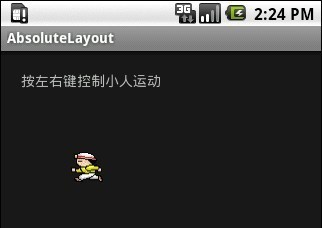Android 中文API (37) —— AbsoluteLayout
前言
本章内容是 android.widget.AbsoluteLayout,版本为Android 2.2 r1,翻译来自madgoat,欢迎大家访问他的博客:http://madgoat.cn/ ,再次感谢madgoat !期待你一起参与Android API 的中文翻译,联系我over140@gmail.com。
声明
欢迎转载,但请保留文章原始出处:)
Android中文翻译组:http://www.cnblogs.com/over140/
正文
一、结构
public class AbsoluteLayout extends ViewGroup
java.lang.Object
android.view.ViewGroup
android.widget.AbsoluteLayout
此类不赞成使用。
推荐使用FrameLayout,RelativeLayout或者定制的layout代替。
二、概述

让你指定子元素的xy精确坐标的布局。绝对布局缺乏灵活性,在没有绝对定位的情况下相比其他类型的布局更难维护。
三、公共方法
public ViewGroup.LayoutParams generateLayoutParams (AttributeSet attrs)
返回一组新的基于所支持的属性集的布局参数
参数
attrs 构建layout布局参数的属性集合
返回值
一个ViewGroup.LayoutParams的实例或者它的一个子类
四、受保护方法
protected ViewGroup.LayoutParams generateLayoutParams (ViewGroup.LayoutParams p)
返回一组合法的受支持的布局参数。当一个ViewGroup传递一个布局参数没有通过checkLayoutParams(android.view.ViewGroup.LayoutParams)检测的视图时,此方法被调用。此方法会返回一组新的适合当前ViewGroup的布局参数,可能从指定的一组布局参数中复制适当的属性。
参数
p 被转换成一组适合当前 ViewGroup的布局参数
返回值
an instance of ViewGroup.LayoutParams or one of its descendants
一个ViewGroup.LayoutParams的实例或者其中的一个子节点
protected boolean checkLayoutParams (ViewGroup.LayoutParams p)
(译者注:检测是不是AbsoluteLayout.LayoutParams的实例,见源码:

protected ViewGroup.LayoutParams generateDefaultLayoutParams ()
返回一组宽度为WRAP_CONTENT,高度为WRAP_CONTENT,坐标是(0,0)的布局参数
返回值
一组默认的布局参数或null值
protected void onLayout (boolean changed, int l, int t, int r, int b)
在此视图view给他的每一个子元素分配大小和位置时调用。 派生类可以重写此方法并且重新安排他们子类的布局。
参数
changed 这是当前视图view的一个新的大小或位置
l 相对于父节点的左边位置
t 相对于父节点的顶点位置
r 相对于父节点的右边位置
b 相对于父节点的底部位置
protected void onMeasure (int widthMeasureSpec, int heightMeasureSpec)
测量视图以确定其内容宽度和高度。此方法被measure(int, int)调用。需要被子类重写以提供对其内容准确高效的测量。
约定:当重写此方法时,你必须调用setMeasuredDimension(int, int)来保存当前视图view的宽度和高度。不成功调用此方法将会导致一个IllegalStateException异常,是由measure(int, int)抛出。所以调用父类的onMeasure(int, int)方法是必须的。
父类的实现是以背景大小为默认大小,除非MeasureSpec(测量细则)允许更大的背景。子类可以重写onMeasure(int,int)以对其内容提供更佳的尺寸。
如果此方法被重写,那么子类的责任是确认测量高度和测量宽度要大于视图view的最小宽度和最小高度(getSuggestedMinimumHeight() and getSuggestedMinimumWidth()),使用这两个方法可以取得最小宽度和最小高度。
参数
widthMeasureSpec 强加于父节点的横向空间要求。要求是使用View.MeasureSpec进行编码
heightMeasureSpec 强加于父节点的纵向空间要求。要求是使用View.MeasureSpec进行编码。
五、补充
文章链接
我的Android学习之旅[6]——以示例程序来展示Android的几种布局方式
如何动态改变 AbsoluteLayout布局中其它布局的坐标
示例代码
android:id="@+id/AbsoluteLayout01" android:layout_height="wrap_content"
android:layout_width="fill_parent" >
<TextView
android:text="TextView01" android:id="@+id/TextView01"
android:layout_height="wrap_content" android:layout_y="10px"
android:layout_width="wrap_content" android:layout_x="110px">
</TextView>
</AbsoluteLayout>
结束
声明图片来自文章1 。









【推荐】国内首个AI IDE,深度理解中文开发场景,立即下载体验Trae
【推荐】编程新体验,更懂你的AI,立即体验豆包MarsCode编程助手
【推荐】抖音旗下AI助手豆包,你的智能百科全书,全免费不限次数
【推荐】轻量又高性能的 SSH 工具 IShell:AI 加持,快人一步
· 10年+ .NET Coder 心语,封装的思维:从隐藏、稳定开始理解其本质意义
· .NET Core 中如何实现缓存的预热?
· 从 HTTP 原因短语缺失研究 HTTP/2 和 HTTP/3 的设计差异
· AI与.NET技术实操系列:向量存储与相似性搜索在 .NET 中的实现
· 基于Microsoft.Extensions.AI核心库实现RAG应用
· 10年+ .NET Coder 心语 ── 封装的思维:从隐藏、稳定开始理解其本质意义
· 地球OL攻略 —— 某应届生求职总结
· 提示词工程——AI应用必不可少的技术
· 字符编码:从基础到乱码解决
· Open-Sora 2.0 重磅开源!
2009-11-15 ExtJs 备忘录(5)—— GirdPanl表格(一) [ 基本用法 ]
2009-11-15 游戏英文词汇700+